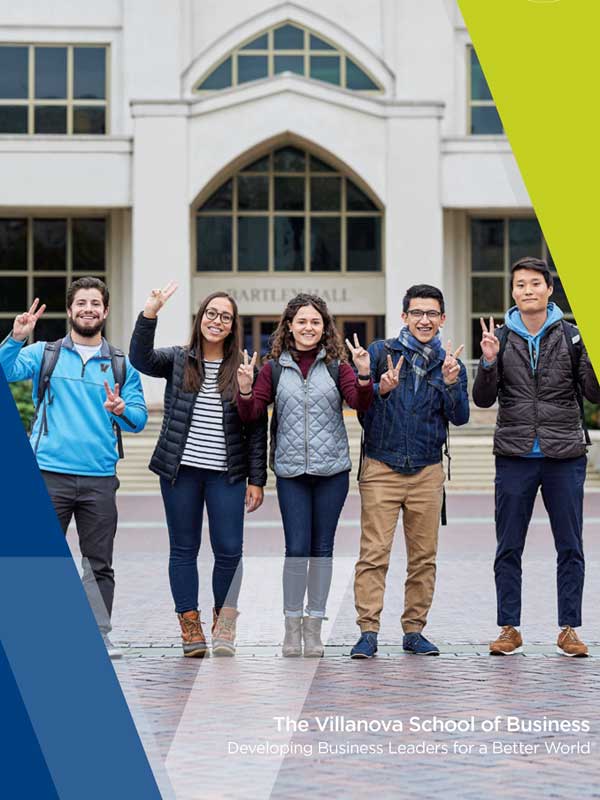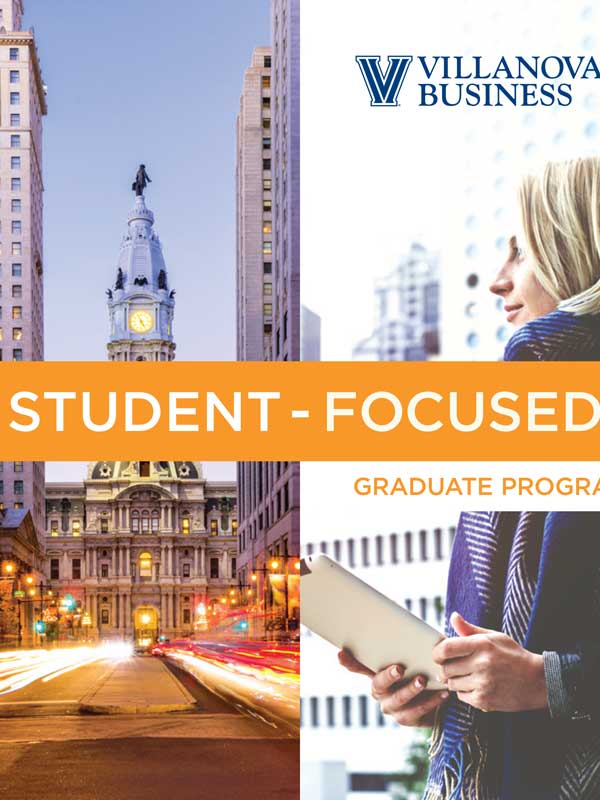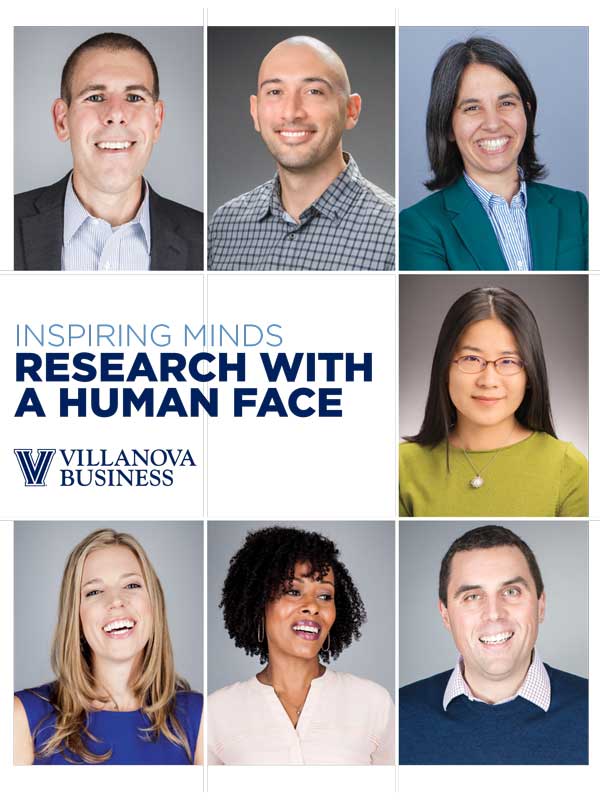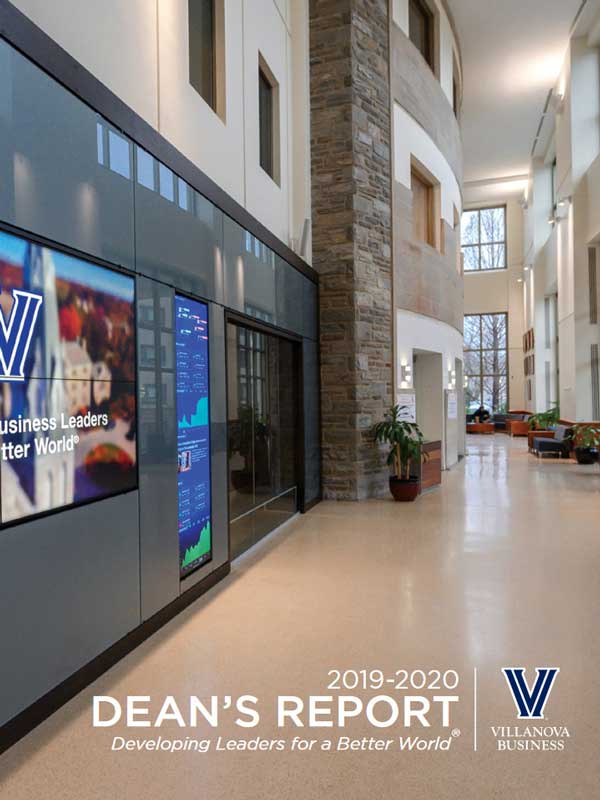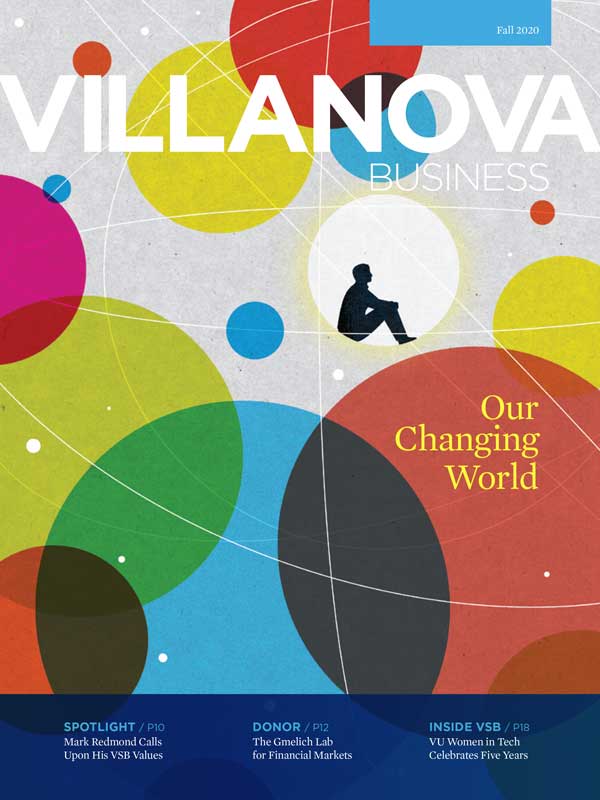WORLD-CLASS TEACHER-SCHOLARS AT VSB
At the Villanova School of Business (VSB), our world-class faculty create and share knowledge with deep passion and enthusiasm.
As experts in their fields, they produce scholarship that’s not only widely published but highly regarded among industry leaders and policymakers.
What’s more, these scholar-teachers impart knowledge through hands-on learning to prepare students to become leaders who drive positive change in business and elsewhere.
About Villanova University
Villanova University is a Catholic Augustinian community of higher education, committed to excellence and distinction in the discovery, dissemination and application of knowledge. Inspired by the life and teaching of Jesus Christ, the University is grounded in the wisdom of the Catholic intellectual tradition and advances a deeper understanding of the relationship between faith and reason. Villanova emphasizes and celebrates the liberal arts and sciences as foundational to all academic programs. The University community welcomes and respects members of all faiths who seek to nurture a concern for the common good and who share an enthusiasm for the challenge of responsible and productive citizenship in order to build a just and peaceful world.
Enduring Commitments
In pursuit of this mission, we commit ourselves to academic excellence, to our values and traditions, and to our students, alumni and the global community.
To foster academic excellence, we as a University:
- Create a diverse community of scholars, united and dedicated to the highest academic standards;
- Emphasize the liberal arts and sciences as our foundation and foster in our students active engagement, critical thinking, life-long learning and moral reflection;
- Concern ourselves with developing and nurturing the whole person, allowing students, faculty and staff to grow intellectually, emotionally, spiritually, culturally, socially and physically in an environment that supports individual differences and insists that mutual love and respect should animate every aspect of university life;
- Encourage interdisciplinary research, teaching and scholarship;
- Affirm the intrinsic good of learning, contemplation and the search for truth in undergraduate and graduate education;
- Support a curriculum that encourages both a global perspective and an informed respect for the differences among peoples and cultures.
- To honor our values and tradition, we as a Catholic University:
- Believe that the dialogue between faith and reason drives the pursuit of knowledge and wisdom, and fosters St. Augustine’s vision of learning as a community ethos governed by love;
- Seek to understand, enrich and teach the Catholic intellectual tradition through our curricula, scholarship and activities in ways that engage diverse religious, intellectual and cultural traditions in a vigorous and respectful pursuit of truth and wisdom in every area of humanity;
- Provide opportunities for students, faculty and staff to seek guidance from Catholic intellectual and moral traditions, while always welcoming people from all faiths, cultures and traditions to contribute their gifts and talents to our mission;
- Respect and encourage the freedom proposed by St Augustine, which makes civil discussion and inquiry possible and productive;
- Look to the Order of St. Augustine to preserve our Augustinian character, by showing appropriate preference to Augustinians in faculty and staff appointments, and by welcoming their presence and influence in our university community.
To serve our students, alumni and global community, we as an Augustinian University:
- Encourage students, faculty and staff to engage in service experiences and research, both locally and globally, so they learn from others, provide public service to the community and help create a more sustainable world;
- Commit to the common good, and apply the knowledge and skills of our students and faculty to better the human condition;
- Encourage our students and faculty to pursue virtue by integrating love and knowledge, and by committing themselves to research and education for justice, with a special concern for the poor and compassion for the suffering;
- Respect a worldview that recognizes that all creation is sacred and that fosters responsible stewardship of the environment;
- Include our alumni as an integral part of the Villanova community;
- Value highly our relationship with neighboring communities.
Villanova University, as a Catholic Augustinian institution of higher education, recognizes diversity as an integral component of the teaching and learning experience and as an essential element of the ongoing intellectual, social and spiritual development of every member of the Villanova community.
Accordingly, Villanova University will be a diverse community. We commit ourselves to cultivating an academic environment marked by genuine curiosity about different perspectives, ardent receptivity to knowledge generated through intercultural connections and a genuine sensitivity to the variety of human experiences marked by domestic and global differences.
Villanova University was founded in 1842 by the Order of St. Augustine. To this day, Villanova’s Augustinian Catholic intellectual tradition is the cornerstone of an academic community in which students learn to think critically, act compassionately and succeed while serving others. There are more than 10,000 undergraduate, graduate and law students in the University’s six colleges.
St. Thomas of Villanova
Villanova University is named for a Spanish Augustinian, Thomas García (1486-1555), born in Fuenllana, a village near Villanova de los Infantes, Castile, Spain. In 1516, Thomas was offered the chair of philosophy at the prestigious University of Salamanca, where the Augustinians had founded a monastery in 1377. Thomas declined the chair and instead entered the Augustinian Order.
Thomas celebrated learning as an activity that should make a difference in the community and the world. He emphasized justice and love as guiding rules of virtue and learning. In Thomas’ writings we find a rich synthesis of the thought of Augustine and Thomas Aquinas, especially his emphasis on the innate desire for God in all peoples, the image of God in the human person, the power of grace, and a theology of love. Thomas was known as “father of the poor” and he established several programs to support those less fortunate in his community.
Augustinian Tradition
The Augustinian Order has always regarded education as a community activity that professes the values of searching for ultimate meaning and commitment to ethical values. Although the Augustinian vision emphasizes the importance of human knowledge and human disciplines for their own sake, the Order also realizes that for a considerable number of students, the Catholic school is the only agent of evangelization. This awareness is reflected in the Order’s Constitutions, 179:
The specific purpose of our schools is the Christian formation and education of the students. It follows that this apostolate should always be regarded as an essentially pastoral activity, so that we teach the truth with love, and the students acquire, along with a humanistic and scientific culture, a knowledge of the world, of life, and of humanity that is illumined by faith.
Accordingly, the colleges and universities which are sponsored by the Order should exhibit the following characteristics:
- A curriculum that reflects the Catholic, Augustinian understanding of human reason and the intellect, and prepares students in their search for more ultimate meaning and value within the Catholic theological tradition. This curriculum should give primacy to the liberal arts and exhibit an openness to all disciplines and professions.
- A special concern for the poor, compassion for the suffering, regard for the value of life and dedicated action for social justice and human rights that can be accomplished through ministry or, possibly, innovative academic course work.
- An esteem for all persons, both in scholarly endeavors and in personal encounters, that is manifested in a curriculum that encourages an understanding and appreciation of the diversity of cultures and experiences, a respect for the individual, and the development of an international perspective.
- A respect for academic freedom which makes open discussion and inquiry possible. Open discussion among scholars and students is intrinsic to inquiry and is in accord with responsible freedom, a central value of the Christian tradition, and of the thought of Saint Augustine, himself the great theologian of Christian freedom.
To read more, visit the Office of Mission and Ministry website.
We Are Villanova
For more than 175 years, Villanova has been a community that ignites change. Our restless hearts and limitless drive lead us to continually reflect upon who we are, who we want to be, and how our Augustinian Catholic values chart our course.
A truly great academic institution must always seek to evolve and advance. This 10-year Strategic Plan—driven by our shared vision for Villanova—will continue to propel our University forward to a new level of success. A platform from which we, as an institution, can reach higher in serving our students, our community and the world.
As we soar, we never lose sight of our humble origins and the Augustinian values upon which Villanova was built. We remain deeply rooted in the traditions and history that forged our community—and ever restless to become an even greater Villanova.
In addition to an unrivaled community of colleagues dedicated to a shared mission, Villanova University also offers a competitive benefits package designed to promote a culture of health and wellness. To learn more, visit the Human Resources website.
Villanova School of Business Vision
Vision: To create a rigorous academic learning environment that transforms lives, nurtures creativity, embraces an analytical approach, espouses a global perspective and develops ethical leaders who positively impact society.
Mission: The Villanova School of Business (VSB) fosters an atmosphere where students and our community can develop intellectual curiosity, experiences, and values needed for lifetime learning.
We collaborate with the business and academic communities to create, share, and apply knowledge to produce strategic, innovative solutions that solve evolving business problems. Strengthened by our Augustinian Catholic tradition, VSB is a community of mutual respect, inclusion, professional development, and continuous improvement.
Veritas: Creative problem-solvers tackling emerging business challenges with expertise and integrity, paired with courage, resolve and strength of character.
Unitas: An inclusive community of collaborative leaders who think holistically and work across disciplines.
Caritas: Humble servant leaders who are ethical, empathetic decision makers, focused on the greater good.
VSB will be a leader in creating an inclusive, equitable and diverse community that serves all members and stakeholders and reflects the University’s commitment to equality, justice and mutual respect. VSB will also seek to increase the representation of underrepresented groups across race, gender, sexual orientation, ethnicity, socio-economic, religious and other social identities and backgrounds.
Villanova School of Business:
Explore our Publications
Get to know VSB’s Executive MBA, part-time MBA and specialized master programs.

